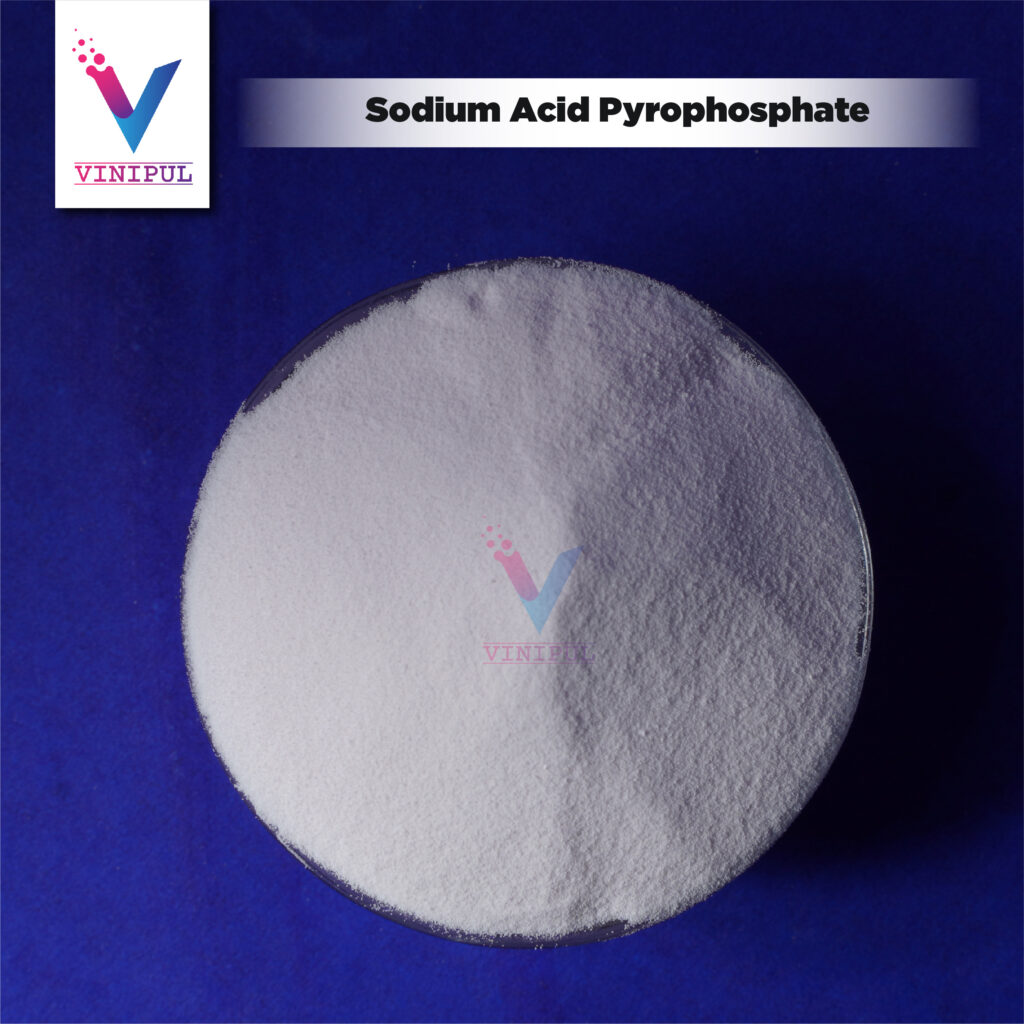Sodium Acid Pyrophosphate Manufacturer and Supplier
CAS No.: 7758-16-9 | EC Number.: 231-835-0 | Molecular formula.: Na2H2P2O7, H2Na2O7P2
Sodium Acid Pyrophosphate
Sodium Acid Pyrophosphate Manufacturers, Sodium Acid Pyrophosphate Suppliers, Sodium Acid Pyrophosphate formula, Sodium Acid Pyrophosphate SDS, Sodium Acid Pyrophosphate MSDS, Sodium Acid Pyrophosphate Exporter in Mumbai, India.
Vinipul Chemicals Pvt. Ltd is a renowned manufacturer, supplier, and exporter based in India, specializing in the production of high-purity Sodium Acid Pyrophosphate (CAS No. 7758-16-9). Our company has established a strong reputation for delivering specialty chemicals that adhere to international industry standards. We take pride in offering Sodium Acid Pyrophosphate that is meticulously formulated using superior purity chemicals and state-of-the-art manufacturing equipment. Our commitment to quality ensures that our product exhibits accurate composition, is free from impurities, and boasts an extended shelf life.
As a prominent sodium acid pyrophosphate manufacturers, we prioritize the production of Na2H2P2O7 with exceptional quality. Our stringent quality control measures ensure that each batch of our product meets the precise required composition, guaranteeing consistent performance and reliability. We understand the importance of providing chemicals that meet the highest standards, and our team of experts ensures that our Sodium Acid Pyrophosphate adheres to stringent quality guidelines throughout the manufacturing process.
Our customers can rely on us for a reliable supply of Sodium Acid Pyrophosphate that not only meets their specific requirements but also exceeds their expectations in terms of quality and purity. As a leading sodium acid pyrophosphate suppliers, we believe in building long-lasting relationships with our clients by delivering products that offer consistent performance and possess an extended shelf life. With Vinipul Chemicals Pvt. Ltd, you can be assured of receiving high-quality Sodium Acid Pyrophosphate that is free from impurities and manufactured using the latest technology and best practices in the industry.
What is Sodium Acid Pyrophosphate?
Sodium Acid Pyrophosphate, also known as disodium pyrophosphate or SAPP, is a chemical compound with the molecular formula Na2H2P2O7. It is a white, crystalline powder that is highly soluble in water. Sodium Acid Pyrophosphate is widely used in various industries for its diverse properties and functionalities.
One of the key applications of SAPP sodium acid pyrophosphate is as a leavening agent in the food industry. When incorporated into baking powders, it undergoes a reaction that releases carbon dioxide gas upon exposure to heat. This gas formation helps dough and batter to rise, resulting in lighter and fluffier textures in baked goods such as cakes, bread, and pastries. Sodium acid pyrophosphate e number E450 is also utilized as a buffering agent in processed foods. It helps to regulate and stabilize the acidity levels, ensuring consistent taste and texture in a wide range of food products. Furthermore, its ability to chelate metal ions makes it an effective sequestering agent, preventing the undesirable interactions between metal ions and food components.
Beyond the food industry, Sodium Acid Pyrophosphate finds applications in various other sectors. In the pharmaceutical industry, it acts as a stabilizer and pH adjuster in medications and formulations. Sodium acid pyrophosphate chemical formula contributes to the preservation and integrity of drugs by maintaining their stability and optimizing their performance.
Sodium Acid Pyrophosphate Details
This table provides information about Sodium Acid Pyrophosphate, a chemical compound with the CAS No. 7758-16-9 and EC Number. 231-835-0. The table also lists various Sodium Acid Pyrophosphate common name and synonyms. The table contains Sodium Acid Pyrophosphate structure, Sodium Acid Pyrophosphate solubility and molecular formula. It is a white granular powder of monoclinic crystals. Sodium Acid Pyrophosphate pH. value is also mentioned in the table. Sodium Acid Pyrophosphate is commonly used in various industries in different applications. It is also used in the pharmaceutical industry for various purposes.
Specifications
| Chemical name | Sodium Acid Pyrophosphate |
| CAS No | 7758-16-9 |
| EC Number | 231-835-0 |
| Commercial name / Synonyms | Disodium diphosphate, Disodium pyrophosphate, Sodium acid pyrophosphate, Disodium dihydrogen pyrophosphate, Sodium polyphosphate, UNII-H5WVD9LZUD,Polyphosphoric acids, sodium salts, H5WVD9LZUD |
| Molecular formula | Na2H2P2O7 H2Na2O7P2 |
| Chemical Structure | 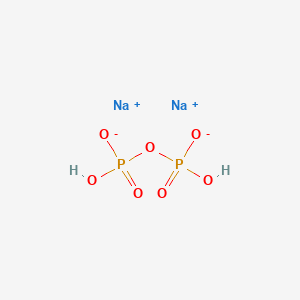 |
| Melting Point | >600 °C |
| IUPAC Name | disodium-[hydroxy(oxido)phosphoryl] hydrogen phosphate |
| Component Compounds | Pyrophosphoric acid Sodium |
| Physical Form | White crystalline powder |
| Physical Appearance | Dry Powder / Pellets Large Crystals / Other Solid |
| Solubility | Slightly soluble in alcohol. |
| Solubility in Water | Yes |
| pH | Between 3.7 and 5.0 (1 % solution) |
| Packaging Details | 25 kg / 50 kg / HDPE packaging bags / Drum/ As per Client’s requirements |
Computed Properties
| Property Name | Property Value |
| Molecular Weight | 221.94 g/mol |
| Hydrogen Bond Donor Count | 2 |
| Hydrogen Bond Acceptor Count | 7 |
| Exact Mass | 221.90711496 g/mol |
| Monoisotopic Mass | 221.90711496 g/mol |
| Heavy Atom Count | 11 |
| Topological Polar Surface Area | 130Ų |
| Complexity | 143 |
| Covalently-Bonded Unit Count | 3 |
| Compound Is Canonicalized | Yes |
Related Compounds with Annotation
The table provides various compounds with their respective Compound CID, Neighbour Type, and Annotation Types Count related to Sodium Acid Pyrophosphate. The compounds listed include Disodium hydrogen phosphate, Sodium phosphate dibasic, Sodium pyrophosphate, Disodium diphosphate, and several others. Each compound is assigned a unique Compound CID, and they are all classified as 2D structures. The Annotation Types Count indicates the number of annotation types associated with each compound. The table provides a comprehensive overview of these compounds and their properties, allowing for easy comparison and analysis.
Sodium Acid Pyrophosphate Price
| Product Range | Price |
| Sodium Acid Pyrophosphate Anhydrous | Rs 90/kg |
| Sodium Acid Pyrophosphate Food grade | Rs 95/kg |
| SAPP | Rs 90/kg |
| Sodium Acid Pyrophosphate Powder | Rs 100/kg |
Prices shown above are provisional prices and may change due to different market conditions for latest prices
Call Us
+91-932 223 1817
Mail Us
business@vinipulchemicals.com
Types of Sodium Acid Pyrophosphate
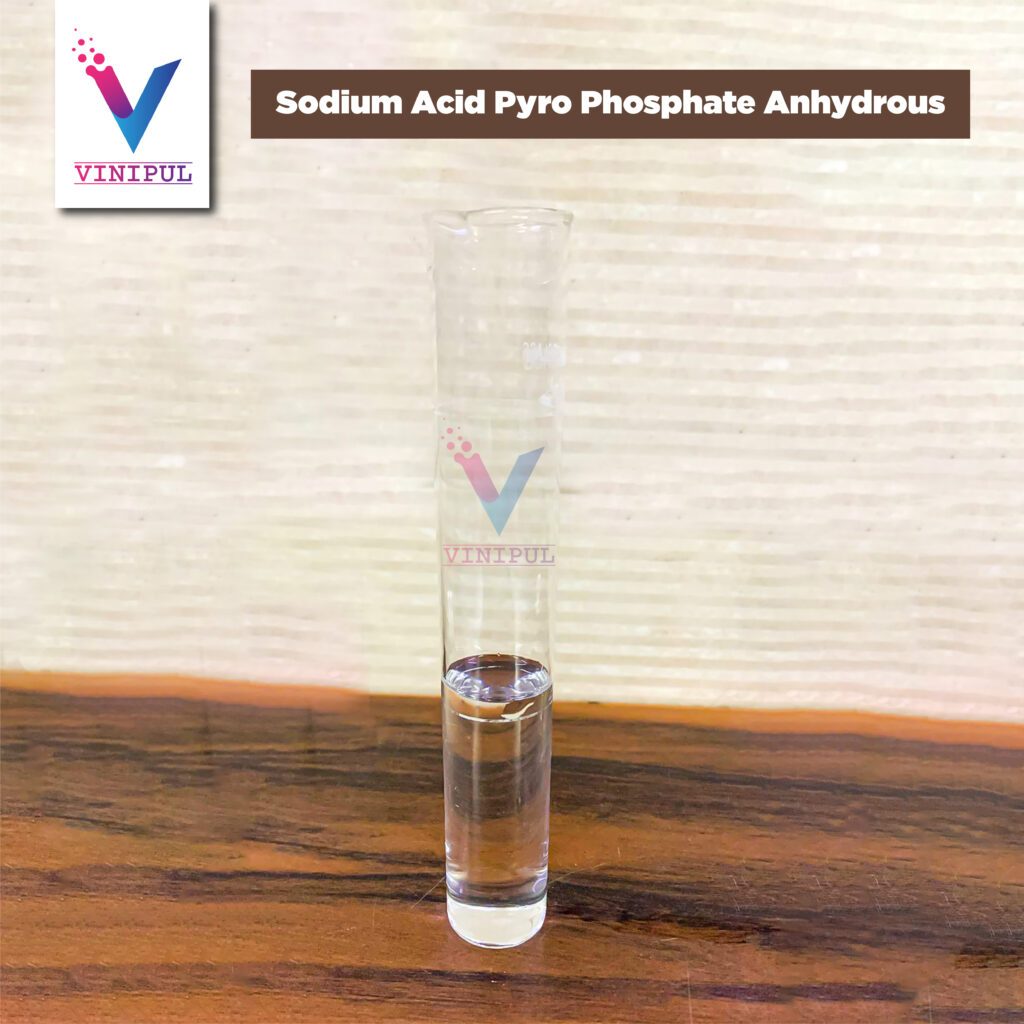
Sodium Acid Pyrophosphate Anhydrous
This type of SAPP is in the anhydrous form, meaning it does not contain any water molecules. It is a white, crystalline powder that is commonly used as a leavening agent in baked goods, such as cakes, cookies, and bread. Sodium Acid Pyrophosphate Anhydrous helps dough
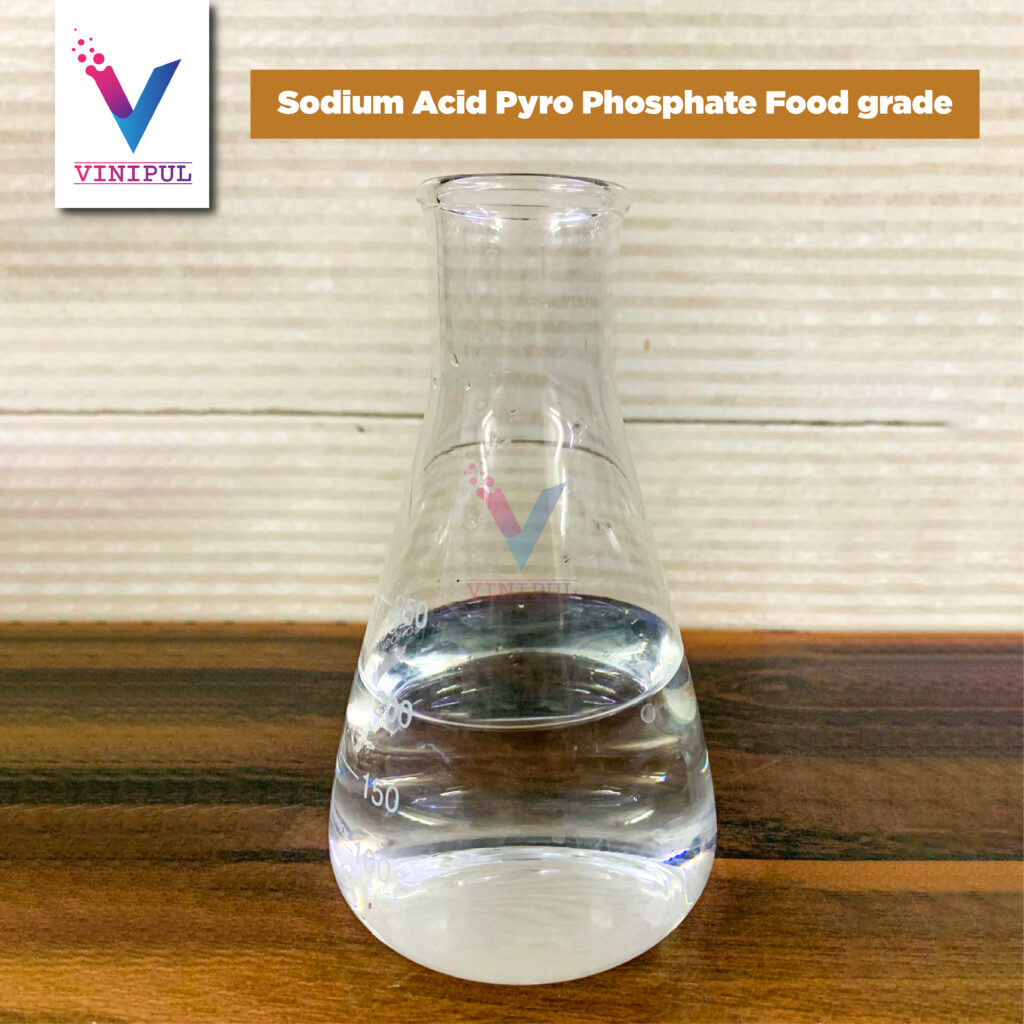
Sodium Acid Pyrophosphate Food Grade
This grade of SAPP refers to the specific quality and purity standards required for use in the food industry. It undergoes rigorous testing and complies with food safety regulations to ensure it is safe for consumption. Sodium Acid Pyrophosphate Food Grade is widely used as a leavening
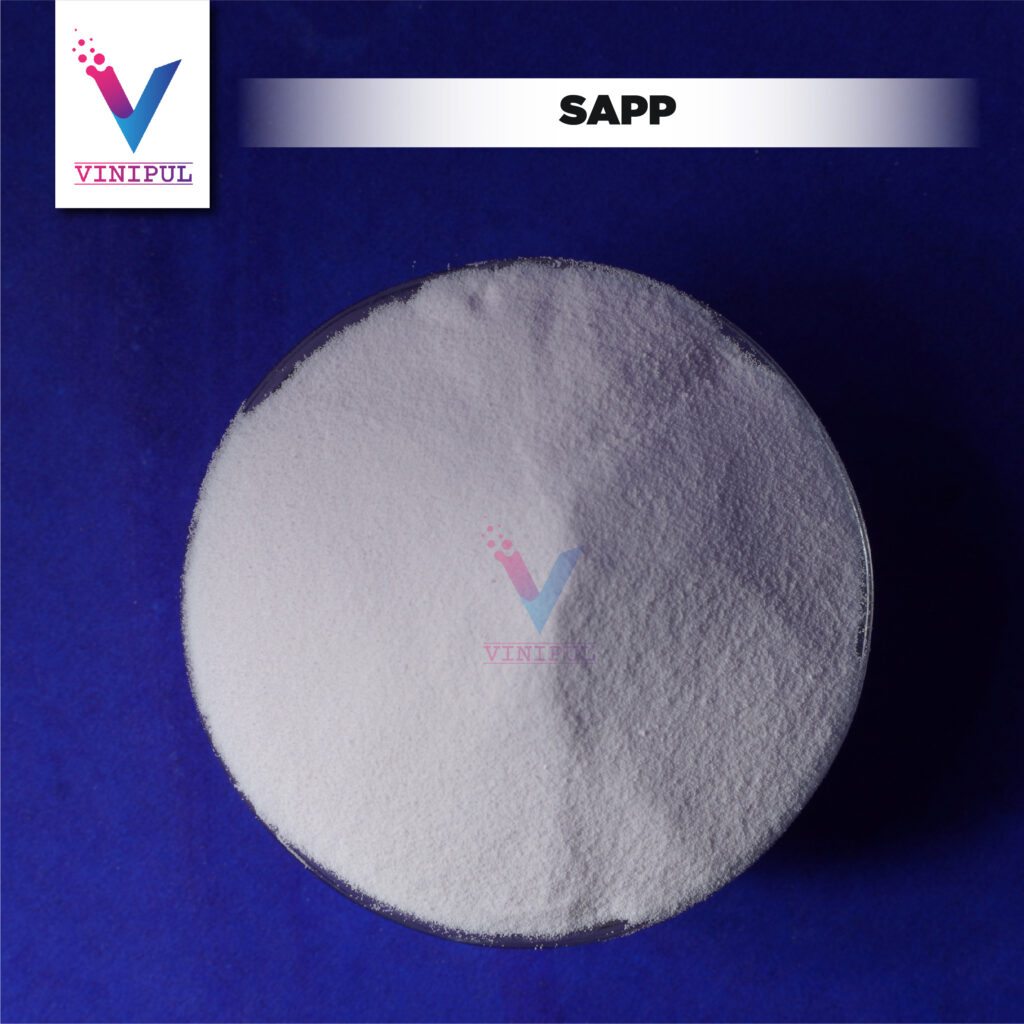
SAPP
SAPP is an abbreviation commonly used to refer to Sodium Acid Pyrophosphate. It is a versatile ingredient that finds applications in both the food industry and other industrial sectors. SAPP is known for its leavening properties, which help create a light and airy texture in baked goods. It is also used as a buffering agent, emulsifier, and stabilizer in various food products.
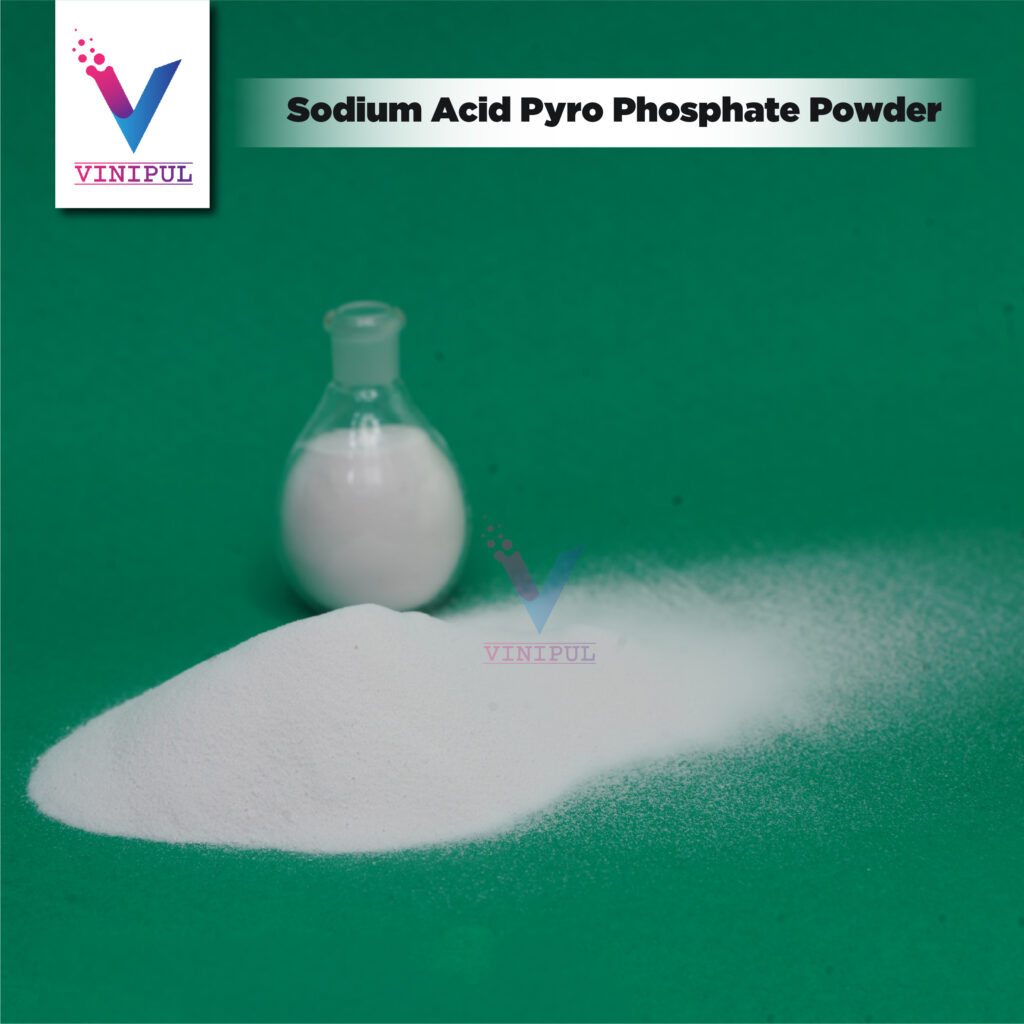
Sodium Acid Pyrophosphate Powder
This form of SAPP is a fine powder that is easily soluble in water. It is primarily used as a leavening agent in baking, where it reacts with baking soda to produce carbon dioxide gas, resulting in the expansion of dough or batter. Sodium Acid Pyrophosphate Powder is preferred in certain applications where a powdered form is more convenient for blending into dry mixtures.
Sodium Acid Pyrophosphate Manufacturing Process
Sodium Acid Pyrophosphate (SAPP) is a chemical compound that is commonly used in the food industry as a leavening agent. It is primarily produced through a manufacturing process involving several steps.
- Raw Material Preparation: The main raw materials required for SAPP production are sodium carbonate (Na2CO3) and phosphoric acid (H3PO4). These raw materials are obtained from reliable sources and undergo quality testing to ensure their purity and consistency.
- Reaction: The manufacturing process begins with the reaction between sodium carbonate and phosphoric acid. This reaction produces sodium phosphate monobasic (NaH2PO4) and carbon dioxide (CO2). The reaction is typically carried out in a controlled environment, such as a reactor vessel, with precise control over temperature and other reaction conditions. Na2CO3 + H3PO4 → 2NaH2PO4 + CO2
- Acidification: The sodium phosphate monobasic obtained from the reaction is then acidified to convert it into sodium acid pyrophosphate. This acidification step involves the addition of phosphoric acid to the sodium phosphate monobasic solution. NaH2PO4 + H3PO4 → Na2H2P2O7 + H2O
- Filtration and Drying: The resulting sodium acid pyrophosphate solution is typically filtered to remove any impurities or solid particles. The filtrate is then concentrated to increase the solid content. Finally, the concentrated solution is dried to remove the water content and obtain the desired powdered form of sodium acid pyrophosphate.
- Quality Control: Throughout the manufacturing process, quality control measures are implemented to ensure the final product meets the required specifications and standards. This includes testing the product for purity, pH, moisture content, and other relevant parameters.
- Packaging and Distribution: Once the sodium acid pyrophosphate is manufactured and passes the quality control tests, it is packaged into appropriate containers, such as bags or drums. The packaged product is then ready for distribution to customers in various industries, including the food industry.
It’s important to note that the manufacturing process may vary depending on the specific production facility and the desired characteristics of the sodium acid pyrophosphate. Strict adherence to safety protocols and environmental regulations is essential during each step of the manufacturing process to ensure a safe and sustainable production.
Is sodium acid pyrophosphate organic or inorganic?
Sodium acid pyrophosphate, also known as Disodium pyrophosphate, is a chemical compound composed of sodium cations and pyrophosphate anions. It is an inorganic substance appears as a white, solid material that easily dissolves in water. Its versatile properties make it a valuable compound in various applications within the food industry, where it is primarily used as a buffering agent and chelating agent.
As a buffering agent, disodium pyrophosphate helps to regulate pH levels in food products. It acts as a stabilizer, preventing significant changes in acidity or alkalinity, and ensuring consistent taste, texture, and colour. By maintaining the desired pH range, it enhances the shelf life and stability of food items, such as canned goods, processed meats, and baked goods.
Is sodium acid pyrophosphate a buffer?
Sodium Acid Pyrophosphate (SAPP) is a versatile compound widely utilized in multiple industries, including food, oil drilling, detergents, and chemical stabilization. In the food industry, SAPP serves various functions such as buffering, leavening, modifying, emulsifying, providing nutrients, and preserving canned goods.
As a buffering agent, SAPP helps regulate and maintain the pH levels of food products. By preventing drastic changes in acidity or alkalinity, it ensures consistent taste, texture, and appearance in a wide range of food items.
Is sodium acid pyrophosphate safe?
Sodium acid pyrophosphate, along with other sodium and potassium polyphosphates, finds extensive application in the food processing industry. In the context of the E number classification system, these compounds are collectively identified as E450, with disodium pyrophosphate specifically referred to as E450(a). In the United States, disodium pyrophosphate is considered to be generally recognized as safe (GRAS) for use in food.
Industrial Applications
Sodium Acid Pyrophosphate (SAPP) has several industrial applications beyond its use in the food industry. Here are some common industrial applications of SAPP:
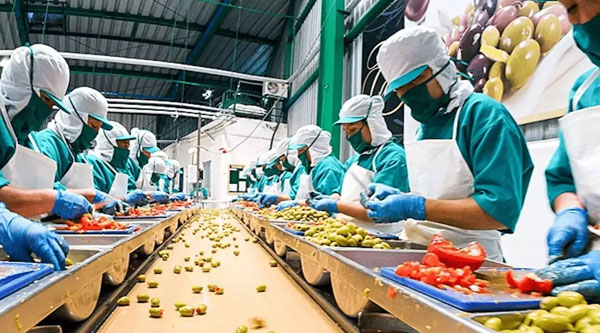
Water Treatment
Sodium Acid Pyrophosphate is used in water treatment processes, particularly in controlling the formation of scale and corrosion in water systems. It helps prevent the build-up of scale on metal surfaces, such as pipes and heat exchangers, by sequestering metal ions and inhibiting their precipitation.

Detergents and Cleaners
SAPP is utilized in the formulation of detergents and cleaners due to its ability to chelate metal ions and enhance cleaning efficiency. It helps remove stubborn stains and mineral deposits, improving the performance of household and industrial cleaning products.

Metal Finishing
SAPP is employed in metal finishing applications, such as electroplating and metal cleaning. It helps remove oxide layers, rust, and other contaminants from metal surfaces, facilitating the plating process and ensuring a clean, smooth finish.
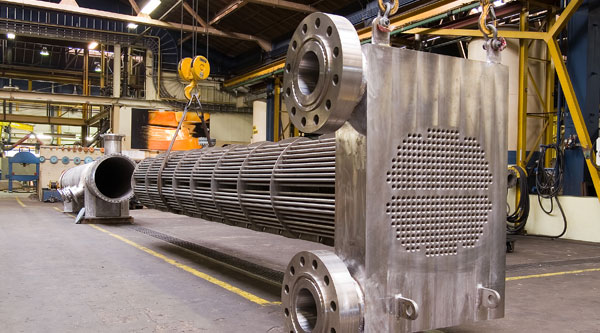
Oil and Gas Industry
Sodium Acid Pyrophosphate finds use in the oil and gas industry for various applications. It is used as a corrosion inhibitor to protect metal components in oil and gas pipelines and equipment. Additionally, SAPP is utilized in drilling fluids to control pH and improve drilling efficiency.

Ceramic Industry
SAPP is added to ceramic glazes and enamels to modify their properties. It acts as a fluxing agent, promoting the melting and flow of the glaze during firing, resulting in a smooth and glossy surface finish.

Textile Industry
Sodium Acid Pyrophosphate is sometimes used in textile processing as a buffering agent to control pH levels during dyeing and printing processes. It helps ensure uniform coloration and enhances the dye uptake of fabrics.
These are just a few examples of the industrial applications of Sodium Acid Pyrophosphate. Its versatility and chemical properties make it valuable in various industrial processes where buffering, chelating, or cleaning properties are required.
What is Sodium Acid Pyrophosphate Used for?
Sodium Acid Pyrophosphate (SAPP) has several uses across different industries. Here are some common sodium acid pyrophosphate uses:
- Sodium Acid Pyrophosphate Uses in Food Industry: Sodium acid pyrophosphate in food industry is widely used as a leavening agent. Sodium acid pyrophosphate baking powder and cake mixes are added to help dough and batter rise during baking, resulting in a light and fluffy texture in baked goods.
- Meat and Seafood Processing: Sodium Acid Pyrophosphate is used in meat and seafood processing as a water-binding agent. It helps improve the moisture retention and texture of processed meats, such as sausages, deli meats, and canned seafood products.
- Stabilizer and Emulsifier: SAPP functions as a stabilizer and emulsifier in various food products. It helps prevent the separation of ingredients and improves the overall stability and texture of products like sauces, dressings, and processed cheeses.
- pH Control: Sodium Acid Pyrophosphate is utilized as a pH regulator in food and beverage products. It acts as a buffering agent, helping to maintain the desired pH level and stabilize the acidity or alkalinity of food and beverage formulations.
- Pharmaceutical Industry: SAPP is used in the pharmaceutical industry as an excipient in tablet formulations. It serves as a disintegrant, helping tablets break down and dissolve quickly when ingested.
- Other Industrial Applications: Sodium Acid Pyrophosphate finds applications in various other industries. It is used in ceramic manufacturing, metal cleaning, oil drilling fluids, and textile processing, among others, due to its buffering, chelating, and cleaning properties.
These are some of the primary uses of Sodium Acid Pyrophosphate across different industries. Its versatile properties make it a valuable ingredient in various products and processes.
About Company
Vinipul Chemicals Pvt. Ltd. is a renowned and trusted manufacturer, supplier, and exporter of Sodium Acid Pyrophosphate (SAPP). With a strong commitment to quality and customer satisfaction, Vinipul Chemicals has established itself as a leading provider of SAPP in the industry. The company boasts state-of-the-art manufacturing facilities that adhere to stringent quality control measures, ensuring the production of high-quality Sodium Acid Pyrophosphate. Vinipul Chemicals’ manufacturing processes are carried out under the supervision of experienced professionals who have deep knowledge and expertise in the field.
As a reliable supplier, Vinipul Chemicals maintains a robust supply chain network, allowing for prompt and efficient delivery of Sodium Acid Pyrophosphate to clients worldwide. The company understands the diverse needs of its customers and strives to offer customized solutions to meet their specific requirements. Vinipul Chemicals takes pride in its strong focus on customer satisfaction. The company believes in building long-term relationships with clients by providing superior quality products, competitive pricing, and excellent customer service. With a customer-centric approach, Vinipul Chemicals ensures that all inquiries and orders are handled promptly and efficiently.
Overall, Vinipul Chemicals Pvt. Ltd. is recognized as a reputable and trustworthy manufacturer, supplier, and exporter of Sodium Acid Pyrophosphate. With its dedication to quality, customer satisfaction, and global presence, Vinipul Chemicals continues to be a preferred choice for customers seeking high-quality SAPP for their diverse industrial applications.
FAQ's
Yes, SAPP is considered safe for consumption. It has been approved by regulatory authorities and is generally recognized as safe (GRAS) for use in food products.
Absolutely! SAPP is commonly used in baked goods as a leavening agent, aiding in the rise and texture development of bread, cakes, and pastries.
No, SAPP is virtually tasteless and odourless, meaning it does not significantly impact the flavour or taste of food products.
Yes, SAPP is suitable for both vegetarian and vegan diets as it is derived from inorganic compounds and does not contain any animal-derived ingredients.
No, SAPP is gluten-free and does not contain any gluten-related ingredients. It can be safely used in gluten-free food formulations.
While SAPP is primarily used in solid food products, it can also be used in certain beverages where pH regulation or stabilization is required.
SAPP is commonly available as a white, granular powder and is typically packaged in multi-layered bags or containers to ensure its quality and prevent moisture absorption.
The shelf life of SAPP can vary depending on the manufacturer and storage conditions. It is recommended to check the packaging or consult the supplier for specific shelf life information.
The use of SAPP in organic food products may depend on regional regulations and certifications. It is advisable to consult organic certification agencies or standards to determine its acceptability in organic food formulations.
Regulatory authorities have established maximum usage levels for SAPP in different food categories to ensure its safe and appropriate usage. It is essential to adhere to these guidelines and regulations.
SAPP is primarily used in the food processing industry. While it is less commonly used in home cooking, some individuals may choose to incorporate it into their recipes for specific purposes, such as improving the texture of baked goods.
SAPP is available from at Vinipul Chemicals Pvt. Ltd, a renowned manufacturer, supplier, and exporter based in India, specializing in the production of high-purity Sodium Acid Pyrophosphate
SAPP is generally considered safe and does not typically cause allergic reactions or side effects. However, individuals with specific sensitivities or allergies should consult with a healthcare professional or avoid products containing SAPP if necessary.
Market Area
We supply and exports Sodium Acid Pyrophosphate in all parts of the world such as
Sodium Acid Pyrophosphate in Africa Countries
South Africa , Nigeria, Kenya, Ghana, Ethiopia, Tanzania, Algeria, Angola, Benin, Botswana, Burkina Faso, Burundi, Cabo Verde, Cameroon, Central African Republic (CAR), Chad, Comoros, Democratic Republic of the Congo, Côte d’Ivoire, Djibouti, Egypt, Equatorial Guinea, Eritrea, Gabon, Gambia, Guinea, Guinea-Bissau, Lesotho, Liberia, Libya, Madagascar, Malawi, Mali, Mauritania, Mauritius, Morocco, Mozambique, Namibia, Nigeria, Rwanda, Sao Tome and Principe, Senegal, Seychelles, Sierra Leone, Somalia, South Sudan, Sudan, Swaziland, Togo, Tunisia, Uganda, Zambia, Zimbabwe.
Sodium Acid Pyrophosphate in Gulf Countries
Oman, Qatar, Kuwait, Saudi Arabia, Dubai, Bahrain, Iran, United Arab Emirates
Sodium Acid Pyrophosphate in Asia Countries
Afghanistan, Armenia, Azerbaijan, Bahrain, Bangladesh, Bhutan, Brunei, Cambodia, China, Cyprus, Georgia, India, Indonesia, Iran, Iraq, Israel, Japan, Jordan, Kazakhstan, Kuwait, Kyrgyzstan, Laos, Lebanon, Malaysia, Maldives, Mongolia, Myanmar (Burma), Nepal, North Korea, Oman, Pakistan, Palestine, Philippines, Qatar, Russia, Saudi Arabia, Singapore, South Korea, Sri Lanka, Syria, Taiwan, Tajikistan, Thailand, Timor-Leste, Turkey, Turkmenistan, United Arab Emirates (UAE), Uzbekistan, Vietnam, Yemen
We supply Sodium Acid Pyrophosphate in all parts of India.
Andhra Pradesh, Arunachal Pradesh, Assam, Bihar, Chhattisgarh, Goa, Gujarat, Haryana, Himachal Pradesh, Jammu & Kashmir, Jharkhand, Karnataka, Kerala, Madhya Pradesh, Maharashtra, Manipur, Meghalaya, Mizoram, Nagaland, Odisha, Punjab, Rajasthan, Sikkim, Tamil Nadu, Telangana, Tripura, Uttarakhand, Uttar Pradesh and West Bengal.
Note: – Please be advised that the information contained in this document is intended for illustrative purposes only. Due to variations in product grade, applications, industries, or uses, the accuracy of the information provided cannot be guaranteed. © Copyright 2023 © Vinipul Chemicals All Rights Reserved (Terms of Use). Reproduction of any material from this site is strictly prohibited without permission. Vinipul Chemicals products are exclusively sold through the company’s website. For precise product specifications and requirements, as well as advice on which products are best suited for your specific application needs, please contact us at business@vinipulchemicals.com Use Terms | Privacy.

